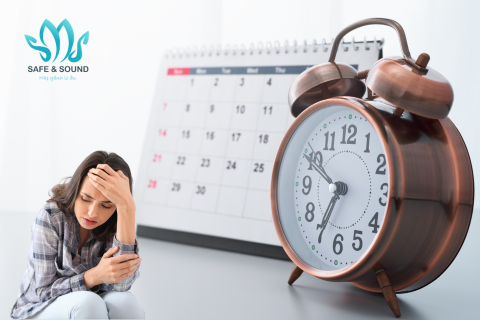Signs of Depression in Women: How to Recognize It Early? | Safe and Sound
Depression is a common mood disorder that profoundly affects a person’s emotions, thoughts, and behavior. Women are at higher risk of depression than men due to biological, psychological, and social factors. Early recognition of the signs of depression in women is important for timely and effective intervention.
Phi Thuy Linh | Bachelor of Public Health – Mental Health Care Application Safe and Sound
Institute of Medical Technology Applications
1. What is depression?

Depression often causes feelings of sadness, loss of interest and lack of energy
Depression is a mood disorder that causes feelings of sadness, loss of interest and energy that last for more than 2 weeks. It can affect the ability to work, study and social relationships. If left untreated, depression can lead to serious consequences, including suicidal thoughts and behavior.
2. Signs of depression in women
Women with depression may experience one or more of the following symptoms:
- Prolonged sadness: Feeling empty and hopeless for no apparent reason.
- Loss of interest: No longer interested in activities once enjoyed, including sex.
- Sleep changes: insomnia or sleeping too much.
- Changes in eating: Loss of appetite or overeating, leading to changes in weight.
- Fatigue and lack of energy: Feeling exhausted even without much activity.
- Feelings of guilt and worthlessness: Blaming yourself, feeling like a burden to others.
- Difficulty concentrating: Having difficulty thinking, remembering, or making decisions.
- Thinking about self-harm or suicide: Having thoughts or behaviors related to self-harm.
If you or a loved one has the above symptoms for more than 2 weeks, see a psychiatrist for timely advice and support.
3. Causes and risk factors
Several factors may increase the risk of depression in women:
- Hormonal changes: Stages like menstruation, pregnancy, postpartum, and menopause can affect the mind.
- Family history: Having a relative with depression or other mental disorders.
- Stress and trauma: Loss of a loved one, divorce, domestic violence, sexual abuse.
- Chronic diseases: Suffering from diseases such as diabetes, cancer, and cardiovascular disease.
- Substance abuse: Using alcohol, drugs, or sedatives without a prescription.
- Lack of social support: Isolation, lack of attention from family and friends.
4. Is depression different in women than in men?
Depression can affect both genders, but there are significant differences in how women and men experience the disease. In women, depression often begins earlier, tends to last longer, and is more likely to recur than in men. Women often experience more “internal” symptoms such as persistent sadness, anxiety, guilt, and low self-esteem. Meanwhile, men with depression may express it through anger, irritability, reckless behavior, or alcohol and drug abuse as a way to “avoid” negative emotions.

Depression in women tends to last longer
5. The importance of early diagnosis
Early recognition and diagnosis of depression in women helps:
- Prevent serious complications, including suicide and other health problems.
- Improve quality of life: Help women maintain relationships and work performance.
- Increased treatment effectiveness: Early treatment often yields better results.
If you suspect you or a loved one has signs of depression, see a psychiatrist for evaluation and appropriate treatment.
6. Methods of diagnosing depression in women
To accurately determine whether a person has depression, psychiatrists will combine many different assessment methods, from exploiting clinical symptoms to using specialized tools in psychology.
- Clinical interview: One of the first steps in the diagnostic process is to take a personal and family medical history. The psychiatrist will ask questions about emotions, behavior, lifestyle habits, sleep, weight changes, ability to concentrate, and level of interest in daily activities. In women, some special periods such as pregnancy, postpartum, pre-menopause will also be focused on because these are times with a high risk of depression.
- Use of questionnaires: Psychiatrists often use standardized screening questionnaires such as the Patient Health Questionnaire-9 (PHQ-9), the Beck Depression Inventory (BDI), or the Geriatric Depression Scale (GDS) for older women. These tools help assess the severity of depression from mild to severe based on criteria that have been tested for reliability and accuracy.
- Screening tests: Medical tests may also be ordered to rule out other physical causes that can cause symptoms similar to depression, such as thyroid disorders, vitamin B12 deficiency, or side effects of certain medications. Psychiatrists often work with internists to provide the most comprehensive and accurate diagnosis.
For women, self-monitoring of personal emotions is also an important step in detecting depression early. If you notice yourself feeling sad for more than 2 weeks, irritable, having trouble sleeping, eating poorly, feeling worthless, or having persistent negative thoughts, you should proactively seek advice from a psychiatrist for timely advice. Delaying the visit can make the disease worse and take longer to treat.
In particular, relatives and friends also play an important role in detecting early signs of abnormalities in women. If you see someone showing signs of alienation from others, sudden mood swings or loss of interest in everything around them, encourage them to see a psychiatrist as soon as possible.
.png)
7. The role of psychiatrists
Psychiatrists are health professionals trained to diagnose and treat mental disorders, including depression. They can:
- Assessment of mental health status: Through interviews and standard medical assessment tools.
- Prescribing: Choosing the right medication for each patient.
- Referral to a psychologist: for psychological therapy
- Monitor progress: Adjust the treatment plan based on patient response.
- Family support: Provide information and guidance to help loved ones better understand and support the patient.
8. Preventing depression in women
Some measures to help reduce the risk of depression:
- Maintain a healthy lifestyle: eat a balanced diet, exercise regularly, and get enough sleep.
- Stress management: Practice meditation, yoga, or relaxation techniques.
- Build a support network: Maintain positive relationships with family and friends.
- Seek help when needed: Don't hesitate to contact a psychiatrist or psychologist if you feel overwhelmed.
- Educate yourself: Understanding depression helps with early recognition and proactive prevention.
Psychiatrists are not just the ones who make the diagnosis but also accompany the entire treatment journey, from prescribing medication and providing psychological counseling to assessing progress. Their role is especially important in helping women overcome difficult times, regaining confidence and quality of life.
So, always listen to yourself, do not hesitate to share your feelings, and seek help from those around you. Most importantly, if necessary, you should see a psychiatrist—someone with expertise and experience to help you overcome depression firmly.
Safe and Sound Clinic - Psychological Support and Family Health
With a team of experienced doctors and experts, Safe and Sound Clinic is a pioneer in providing comprehensive healthcare for you and your family, offering services that cover both medical and psychological care.
"Early Prevention - Timely Support - Long-Term Companion."
If you suspect or encounter any physical or mental health issues, please contact HOTLINE 0964 778 911 (Phone/Zalo, 24/7) for prompt assistance and support!
HOW TO MAKE AN APPOINTMENT
You can schedule an online or in-person consultation with our experts:
- At SnS Clinic - IMT Institute
- Or download and schedule a consultation through the Safe and Sound app to manage and track your appointments anytime, anywhere.
Safe and Sound (SnS) - a part of the Institute of Medical Technology (IMT)
See also:
Which hospital to go to for depression treatment (Part 1)?
Am I suffering from postpartum depression?
What should you keep in mind when going to see a doctor for depression?




